Book I
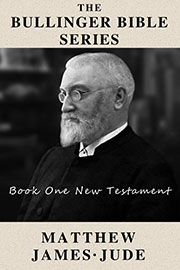
Book II
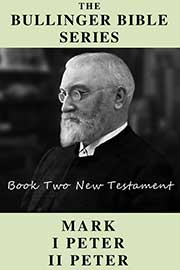
Book III
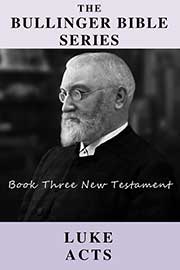
Book IV
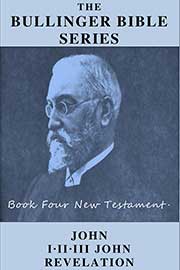
Book V
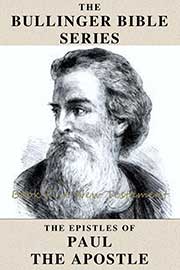
Bullinger Bible Series Script Notes
Born in Canterbury, England, in 1837, the year Queen Victoria came to the throne, Ethelbert Bullinger lived out his life within the Victorian Era.
Ethelbert Bullinger was, first and foremost, a man of the Bible: but he was also a man of Victorian England and a man of the Anglican Church.
His parents though were members of the Methodist Church, and Ethelbert’s early Methodist training was to leave a significant mark on his ministry and writings.
Bullinger was admitted to King’s College’s Theological Department in 1860, and completed the two year course in a year and a half, and left the College a sound Greek scholar; with a mastery of Hebrew which few can boast.
Bullinger was a well-known preacher, and auxiliaries strove for the privilege of having him at their meetings.
Rev. Dr. Bullinger, was the learned secretary of the Trinitarian Bible Society. His lifelong contribution to the Trinitarian Bible Society should not be underestimated-nor should the Society’s influence on his Life.
But Bullinger never was a man of the mainstream. He was one of those rare individuals who lived his life influenced by neither the praise nor the fear of other people.
He wrote, “We are called to be faithful in our testimony.”
Bullingerism was coined by his critics to designate those positions with which they did not agree.
“Bullingerism” denoted Bullinger’s stand against water baptism and the Lord’s Supper as not being intended for the church age: his distinctions between the church of the bride found in the gospels and the church of the body recorded in the Pauline epistles; his views on death and what happens to the soul after death; and the study of biblical future events.
The most important objection of Dr. Bullinger’s teaching, however, was usually with regard to his stand on what is labeled “Dispensationalism”.It was his claim that the Christian church commenced after Acts 28:28, as outlined in his book (The Foundations of Dispensational Truth), instead of the Day of Pentecost.
Excerpts from E.W. Bullinger, A Biography, by Juanita S. Carey, © 2012
A college’s quotes about the man:
Excerpts from E.W. Bullinger, A Biography, by Juanita S. Carey, © 2012
Harold P. Morgan wrote in 1943,
Dr. Bullinger attained considerable intellectual acumen seems to be conceded by the stoutest of his opponents.
Dr. Bullinger was a great spirit and a constant source of inspiration in my own life…
He was a man to love and admire…a great and good man whom to know was to love…
A large number of our leading Evangelical ministers have benefited by his instruction and blessed by his life…the whole Church contains no nobler man than Dr. Bullinger…the warmth of his handclasp, the light in his eye, and the genial smile, created at once a feeling of friendship.
A finer man and truer friend than Dr. Bullinger I have never known.
He was a brave and gentle soul who loved goodness and revered God’s Holy Word.
He preached the genuine Gospel of God’s grace with rare power and charm…
Great as he was intellectually he impressed me as one of the most modest men I have known.
And other Bible Scholars, and Theologians wrote,
Juanita S. Carey, E.W. Bullinger, A Biography, © 2012
Henry Grube (1978) wrote,
Bullinger would be called a fundamentalist, an able defender of the inspiration of the Bible, the deity and virgin birth of Christ, the substitutionary atonement, the premillennial coming, and all that.
But he was an extremist, some would call him a fadist on dispensational truth, and he was unscriptural, we believe on future retribution.
He did make several serious errors in his writings.
Search the records. Every great Bible scholar has failed at some point, it is always unfortunate when a scholar’s so-called blunders are allowed to obscure the rest of their work in the eyes of posterity.
He relied on independent research rather than religious orthodoxy remains for many the hallmark of Bullinger’s work.
Warren W. Weirsbe (1979) wrote,
We may not agree with him, but at least we have the opportunity to examine our own convictions in the
light of his thinking…
We must confess that he stimulates us to give our very best to the study of the Word of God.
E.W. Bullinger‘s life was devoted to the detailed analysis of the Scriptures.
A perfectionist in his analysis and a prolific writer, his volumes shed light not just upon the Scriptures, but upon the compendium of the tools that give power, persuasion and meaning to the written word.
Our Mission & Vision
Dr. Bullinger in (The Apocalyse) wrote,
None are more cognizant of imperfection and failure than ourselves; and, after all we have done, there
is still much left for others to do.
E.W Bullinger
We do not exhaust the Book:
He has said, regardless alike of the praise of man or the fear of man, and quite apart from all traditional beliefs or interpretations.
May the Lord own and use and bless our effort for His own Glory and the good of His people.